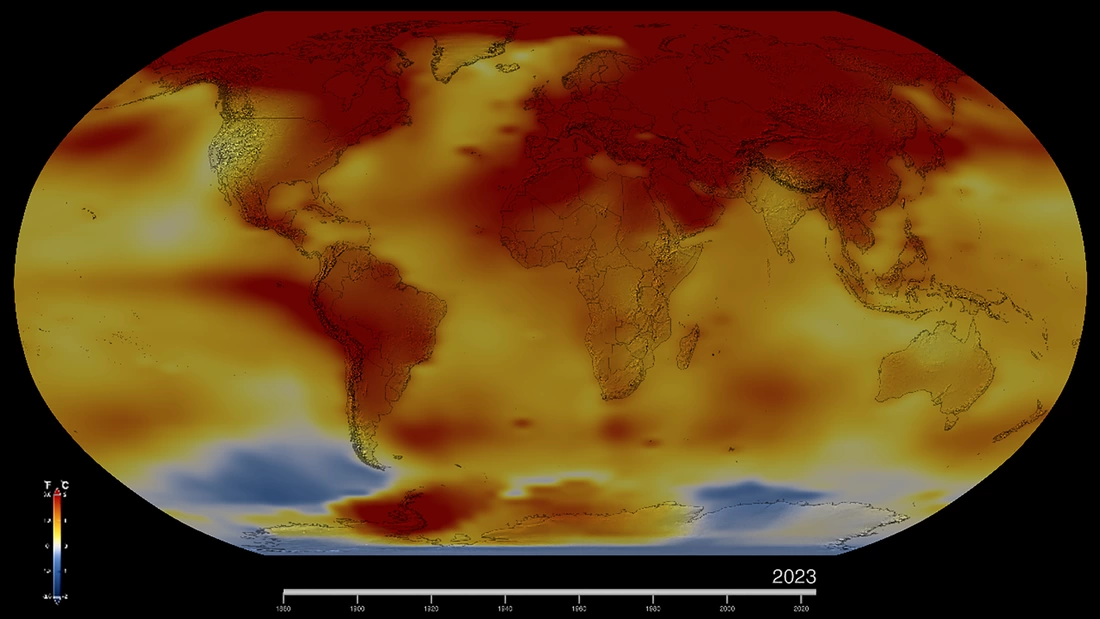|
From NASA Analysis Confirms 2023 as Warmest Year on Record, we see that most of Canada is in the red. 2023 was Earth’s warmest year since modern record-keeping began around 1880, and the past 10 consecutive years have been the warmest 10 on record. -NASA The news is apparently even more onerous for us. According to Natural Resources Canada: Canada is warming faster than the world as a whole — at more than twice the global rate — and the Canadian Arctic is warming at about three times the global rate. That accelerated pace is often repeated in the media and by authorities such as Geography Professor, Gordon McBean. Last summer CTV News ran the story Canada warming twice as fast as rest of planet, Western University environment expert says: “When we talk about 1.5 degrees, that’s 3 degrees in Canada, and we’re projecting now that it looks like it could go to 2.5 degrees globally, which could be 5 degrees in Canada by the end of this century,” he said. If NASA says that the last 10 years have been the warmest on Earth (with 2023 topping the charts) and Professor McBean says that if temperatures have gone up 1.5 C globally then they would be up 3.0 C for Canada, then records all over the country must be getting smashed every year! How do NASA's global rankings compare with Canada's over the last 10 years? Clearly, there is big discrepancy between what NASA tells us and what has been observed by Environment Canada. How can we be heating up 2 or 3 times faster than the rest of the world when only 3 of our last 10 years made the Top-10? Apparently 2020 was the 2nd warmest year recorded on Earth, yet it was down in 16th position for Canada. The Warmest Years - Environment Canada data table lists 2010 as Canada’s record year for heat. The 2023 rank for Canada hasn’t been officially established yet, but 2nd place positioning for last year is likely considering the results of a survey by this website of annual heat records for 40 geographically diverse Canadian locations from coast to coast to coast, including the arctic archipelago: * expected ranking Regarding 2023, the NASA warmest year article emphatically stated: “The exceptional warming that we’re experiencing is not something we’ve seen before in human history,” said Gavin Schmidt, director of GISS. Yet in Canada it appears that 2023 didn’t out-do 2010.
The following sets out the hottest years observed for 40 locations representing a comprehensive range of Canadian climate regions: 40 Canadian Stations (locations with record heat year) – from Environment Canada data 2023 (9 records) Fort Nelson, Prince George - BC Fort McMurray - AB Churchill (tie), Flin Flon - MB Whitehorse - YK Norman Wells, Yellowknife - NT Baker Lake - NU 2021 (3 records) Gaspe, Saguenay (tie) - QC Eureka - NU 2016 (3 records) Prince Rupert - BC Dawson City - YK Alert - NU 2015 (1 record) Kelowna - BC 2012 (4 records) Sudbury (tie), Toronto, Windsor - ON Montreal - QC 2010 (13 records) Pickle Lake, Moose Factory (tie), Sudbury (tie) - ON Blanc-Sablon, Kuujjuaq, Saguenay (tie) - QC Labrador City - NL Cambridge Bay, Clyde River, Iqaluit, Pond Inlet, Resolute, Sanirajak - NU 2006 (2 records) Churchill (tie) - MB Moose Factory (tie) - ON 1999 (2 records) Halifax - NS St. John’s - NL 1998 (3 records) Thunder Bay - ON Inuvik, Sachs Harbour - NT 1987 (2 records) Calgary (tie) - AB Winnipeg - MB 1958 (1 record) Vancouver - BC 1931 (1 record) Regina - SK 1918 (1 record) Calgary (tie) - AB From this survey, it appears that 2010 is still Canada’s warmest year, with 13 records (including 3 ties) occurring throughout a large north-eastern area of the country. By comparison, there were 9 locations (including 1 tie) that experienced their hottest year in 2023 in a somewhat smaller north-central region. As well, the average yearly maximum temperatures (Environment Canada data) for the combined 40 locations, support 2010 in first place at 4.5 C versus 2023 in second at 4.4 C, with 2006 in third at 4.1 C. Last year’s 8 new records represent only 20% of the country. For a year that, as Gavin Schmidt emotes, was … not something we’ve seen before in human history, the Canadian part of the 2023 global heat crisis is a little underwhelming. The facts don’t align with the hype. Either 2023 and the last 10 years were not the hottest ever globally, or the narrative that Canada is warming 2 to 3 times faster than the rest of the planet, is incorrect … likely both.
0 Comments
Leave a Reply. |
Hot Topics
Aboriginal Title Almost Record Heat Atmospheric Rivers Attribution Simulation Carbon Capture Child Litigation Climate Shift Index CO2 Offset Leakage Coastal Flood Risk Democracy Lost Drought Exaggeration Eco-Negativity Eco-Politics ESC Investment Evolution Excess Hydro Expert Hypocrisy Extreme Heatwaves Fake Hype Geo-Engineering Government Bias Heat Waves Hottest Month Ever Hottest Year Ever Housing Crisis Hyperthermia Ice Roads Indigenous Conservation Indoctrination Kelp Farms Landslides Media Bias Mental Illness Misplaced Reconcilliation Misleading Data National Discord Natural Gas Net-Zero Future Outside Play Park Take-Over Political Deception Public Safety Impasse Sea Level Ruse Socialist Agenda Solar Panels Species Not At Risk Statistical Dishonesty Sue Big Oil Temperature Trickery Treaty Infringment Tsunami Refuge Unmarked Burials Unprecedented Drought Urban Heat Island Very Hot Days Warming Causes Cold Water Supply White Dislike Wildfire Wildlife Death Woke Plans Worsening Storms |



